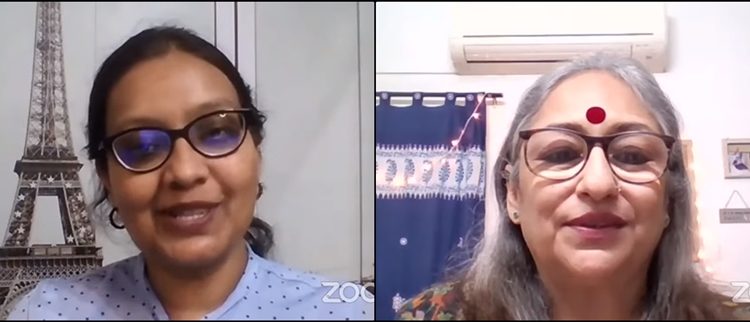
New Delhi (20/01/2022): Rajpreet Kaur, founder of the Say Cheese, was recently in conversation with the public affairs professional Priti Srivastava, Founder DayaRani initiative, which works on mental health awareness.
Srivastava has been in the corporate world for 36 years and is currently working as Senior Vice President, Corporate Affairs at Reliance Industries Limited. Indeed, despite achieving so much and being at the forefront of multiple initiatives that aim at giving back to the society, she considers herself a student of life and aims to do much more that what she already has done and achieved.
|“I still feel there is much more to be done and what I aim to do is still not achieved, so we are always like a student – learning and giving back to society,” she says at the start of the free flow conversation that outlines various great insights about working culture changes since over four decades.
Excerpts of the interview:
Q: According to you what is the ‘Glass Ceiling’ and what it is really about?
Ans: I came across this word in the late 90’s. When I started in 1984 when there were lot of social norms and barriers and the recruiters only accept the application of one gender, which later on became glass ceiling. I feel that the glass ceiling only exists in our mind, if we can break it up there, we can break it in the real world.
Though I think glass ceiling doesn’t exist but if we go by conventional definition, some people might think that I too have broken one. As when I started my career in public affairs there were no women professional in the field and I think a lot of women don’t take this profession seriously. In my opinion there is no such thing called glass ceiling, we are the only one who have created it. Yes, there are barriers, issues and social norms but I will not call them glass ceiling.
Q: How will you compare your journey with that of a person of the other gender, who has also reached such senior positions?
Ans: I feel that there is a difference in “giving directions” and “giving direction”. A woman gives you direction and doesn’t really direct. It is because of the upbringing as from the start that men are made tough to present themselves as a leader but the women generally have a motherly instinct and sympathetic towards personal issues. In my organisation everyone calls me Priti Ma and they used to come to talk to me on personal level too. However, I don’t believe in this gender parity notion. I want women to be known as leaders and not women leaders. We (women) only keep ourselves in the compartment as a female and we should not categories. I hope in future there would be no gender inequality.
Q: Any suggestions on the changes that should be made in current work condition for women workforce in the corporate world?
Ans: The first thing that needs to be change is gender inequality. Secondly, that we need to change the notion which some recruiter have in their mind like women can’t work late at night, are uncomfortable in traveling. All these notions have proven wrong recently. Hence we have to change their rule book which they follow. Then, there is a huge difference in the amount paid to senior women professionals than men sitting on the same post like VP’s and the board members. There should be equal pay for everyone irrespective of their gender.
Q: What efforts can be done by an organization to support women at a junior level to assist them in their career marathon and enable an environment that can take them to the senior positions?
Ans: I think the basic problem with junior employees is that they don’t have the clarity of their career path. The organisation should give them the clarity of all the opportunities that are waiting for them at the point of the recruitment only. So, that the employee’s will get motivated and work towards achieving it.
Q: Is women leadership always about reaching to the top?
Ans: No, It’s about achieving the goals. The definition of top varies from person to person, for me the most important thing is to have clarity of mind and to try have a core competence in what we do.
Q: What are the most important skills upcoming generation needs which will help them to progress in their career?
Ans: First parenting should change; Parents should treat their children equally whether it’s a girl or boy. There should be no discrimination in toys, in the books or in anything, they should support them. Secondly, teachers at school should also treat the children the same way and teach them to follow their heart, their hobbies. Now-a-days people can make a career out of their hobby. If the foundation changes then only it the problem of gender inequality issue will solve.

